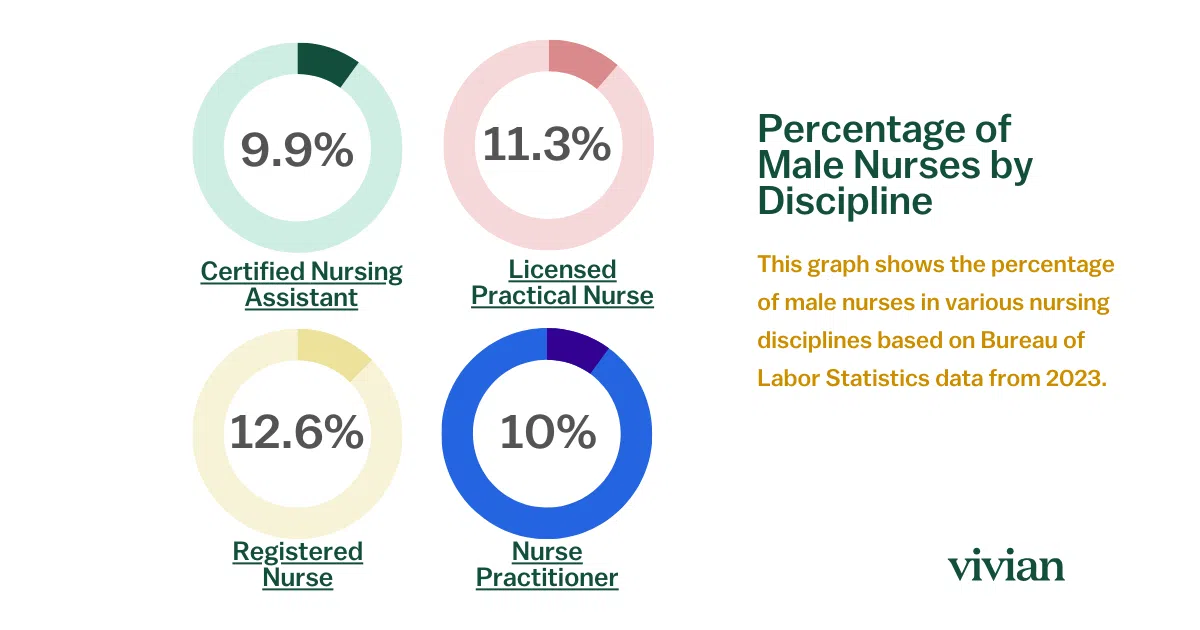It’s a great time to become a male nurse. Historically dominated by women, the nursing profession is starting to see a shift as more men join its ranks. This change challenges traditional gender norms and enriches healthcare teams’ diversity.
We chatted with male nurses working around the country in various roles to gain a deeper understanding and insider perspective. With male nursing numbers on the rise, let’s explore the top reasons why now is the perfect time for men to pursue this rewarding career path.
6 Reasons for Men to Pursue a Career in Nursing

1. Gender Diversity Can Address the Nursing Shortage
Our nation is amidst a widespread nursing shortage. The increased demand for nurses in an already stressed healthcare system is cause for concern. Data from the Health Resources and Services Administration’s Nursing Workforce Survey from 1977 to 2018 shows that in 1977, less than 2% of nurses were male, but the prevalence of males in nursing has steadily increased.
From 1977 to 2018, the number of male nurses increased by 2 – 3% every decade. A sharp upward curve within the past five years shows the percentage of males in nursing has increased from 9.6% to 12.6%. If male nurses continue to enter the workforce in such high numbers, the decade from 2018-2028 should see an increase of 6%. With this growth projection, the nursing population could be nearly 20% male by 2028, making this decade the most substantial period in recorded history for the growth of men in nursing.
The number of male nurses entering the profession is a promising solution to address the critical nursing shortage. Patrick Pickarts, an Illinois emergency room nurse and health IT consultant, says, “It’s common knowledge that we’re in the midst of a longstanding nursing shortage, which will not be solved by engaging only half of the workforce. This is an all-hands-on-deck situation!”
According to the American Association of Colleges of Nursing, actively recruiting students from underrepresented demographics, including men, is imperative to meet the growing demand for nursing professionals. This strategy enhances diversity within the nursing workforce and ensures that the healthcare system is equipped with skilled and inclusive caregivers to meet the needs of diverse patient populations.
2. Career Stability and Growth Prospects

Looking ahead, prospects within nursing continue to grow and be promising, making nursing a solid career choice with plenty of employment options. The Bureau of Labor Statistics (BLS) predicts a 6% growth in demand for nurses between 2022 and 2032, which equals a need for roughly 193,100 new registered nurse (RN) jobs annually for the next decade. This skyrocketing demand means there’s no shortage of work for new nurses entering the profession, regardless of gender.
Let’s look at nursing jobs on the Vivian Health marketplace. In mid-March 2024, the platform had 5,287 staff RN positions and a whopping 79,669 travel RN jobs posted. Additionally, there were 418 staff vacancies for licensed practical/vocational nurses (LPN/LVNs) and 1,946 travel LPN/LVN positions.
Whether you’re thinking about permanent positions or jet-setting around as a travel nurse, there’s something for everyone. Nursing offers flexibility and tons of specialties to explore.
3. Ample Opportunities
Steven Marshall, DNP, MSN, BSN, RN, is a clinic nurse manager in North Carolina. With over three decades of nursing experience, he shares his expertise as a nurse coach and the founder of See Doc Nurse Write. Dr. Marshall has worked in critical care, emergency room, air and ground transport, oncology, infectious disease, inpatient physical rehabilitation and more. He has held positions ranging from entry-level staff nurse to director and reports, “Nursing is a great profession that has nearly limitless possibilities.”
Dr. Marshall thinks men tend to gravitate towards critical care nursing and can be prevented from working in certain areas, like labor and delivery, due to patient preference.
He reflects on his experience, saying, “When I was in school in the early 1990s, I was only able to observe two births. Many others initially said yes to a student, then changed their mind when they saw that I was a male.”
The 2018 National Sample Survey of Registered Nurses confirms this in its findings that most male nurses work within a hospital setting in critical care, emergency, psychiatric, mental health or nephrology. However, this still offers diverse opportunities in the nursing field.
The graph below shows the percentage of male nurses in varying roles based on BLS data from 2023.

4. Competitive Salary and Benefits
Although male nurses make up less of the nursing workforce, their annual salary was $9,000 higher than their female counterparts, per a 2018 Bureau of Health Workforce report. The survey findings confirm that men tend to specialize, which offers higher earning potential.
To provide insights into nursing specialty salaries, the table below summarizes the average weekly staff and travel pay of specialties male nurses may prefer. On March 17, 2024, we gathered salary information from Vivian and multiplied the available hourly staff wage by 40 hours per week to calculate the weekly staff salary.
| Specialty | Average Weekly Staff Pay | Average Weekly Travel Pay |
| Intensive Care Unit | $1,846 | $2,171 |
| Emergency | $1,846 | $2,137 |
| Psychiatric | $1,837 |
$2,079 |
| Mental Health | $1,837 | $2,079 |
| Nephrology | $3,271 | $2,130 |
View transparent RN salary expectations and gain insights into your career path’s average and maximum earning potential on Vivian Health.
Related: A Guide to Career Paths & Earning Potential in Healthcare
5. Unique Skill Set

Dr. Marshall believes males add diversity to nursing. He says, “Male nurses have often been helpful in helping defuse volatile patient situations where other staff were being harassed or otherwise treated poorly.”
Keith Carlson, BSN, RN, NC-BC, adds that male nurses possess the same skills as their female counterparts: compassion, collaborative spirit, kindness and caring. Carlson has been a nurse since 1996. He works as an RN in Santa Fe, New Mexico, and as a holistic career coach for nurses and healthcare professionals.
He adds, “In certain circumstances, a male nurse who possesses significant physical strength and a solid back may be called upon to help with a difficult transfer.”
Pickarts believes, “Nursing is a team sport where varied experience in work, life and background all matter. Having an increased male perspective in nursing engenders a more holistic workforce.”
Erik, an RN in critical care in Florida, has found being a male nurse to be an asset when caring for male patients. They often share the same experiences, making it easier to establish trust and rapport. Erik encourages more men to join the nursing profession, saying, “I believe our direct approach to problem-solving can be an asset in healthcare settings, where quick decision-making is crucial.”
6. Decreasing Stigma and Stereotypes in Male Nursing
A study in the International Journal of Environmental Research and Public Health reports that male nurses face discrimination that questions their masculinity, sexual impulses and professional competence. The report also indicates that an increase in patriarchal religions and cultures could lead to a harsher stigma of male nurses.
Pickarts pulls from his own experience, noting, “Absolutely, there are lingering stereotypes. I am 38 years old and don’t consider myself an old nurse or a new nurse. I very clearly remember people repeating back to me when sharing my college plans, stating with reticence, ‘Oh, so you’re going to be, like, a male nurse?’”
Julio Garcia, BSN, RN, is the executive director of nursing at the University of Miami Health System, where he has worked in various positions since 2015.
“Sadly, there are still some outdated ideas floating around about male nurses,” he tells us. “People might question their reasons for choosing nursing or doubt their abilities compared to female nurses.”
However, Garcia adds hope to the situation, saying, “But we can change that by spreading awareness and showing just how diverse and talented male nurses really are. It’s all about having honest conversations and breaking down those old stereotypes.”
Erik recalls being told by patients that they didn’t want a man caring for them. He felt they assumed the worst about his abilities because of his gender.
He says, “It’s frustrating to face such bias in a scientific profession when I just want to help people.” But, Erik says his career struggles subsided when he found the right nurse mentor to help along the way.
Carlson admits that there are lingering myths, stigma and stereotypes for men in nursing, but he thinks these are beginning to fade as younger generations become more open-minded and accepting of nontraditional gender roles.
Pickarts adds, “I do palpate progress and openness in the field. Change takes time. I see society heading in the right direction on this social norm.”
Tips for Men in Nursing

Pickarts wants male nurses to know that becoming an RN opens many doors beyond traditional healthcare roles and that the options are limitless. Beyond a bedside nursing job, he has held positions as a health IT consultant, healthcare change management leader, nursing content writer and software sales manager. Pickarts also worked as an Epic analyst and informatics director and has worked with many healthcare startups.
He encourages men to enter the profession and says, “Nursing is not for everyone, but it’s definitely for many men.”
Dr. Marshall shares this view and offers, “My advice to any males considering the nursing profession is to pursue the opportunity. You never know where it may take you.”
“If you’re a guy thinking about nursing or already in the field, remember to embrace the diversity around you and learn from others,” prompts Garcia. He encourages new nurses to find a mentor to help guide them along the way. “Most importantly,” Garcia reminds male nurses, “Take care of yourself too – nursing can be tough, so don’t forget to lean on others when you need support.”
Erik encourages male nurses to address situations that cross boundaries, “As perceptions of men in nursing evolve and more men join the field, stereotypes will diminish. Stay resilient and pursue your nursing dreams with confidence. It’s a profession filled with security, growth and personal fulfillment. Don’t let outdated gender norms hold you back.”
Resources for Male Nurses
Books:
- A look into the world of nursing from a male nurse with 16 years experience
- Wisdom, insight and lessons learned through hands-on, practical experience
Online:
American Association of Male Nurses
- Provides support and resources to shape the practice, education, research and leadership for men in nursing and advancing men’s health
- Offers special certification and tuition discounts, continuing education, scholarships, special merchandise and scrub discounts, voting rights and educational discounts, a members-only Facebook page, newsletters, special announcements and annual conference discounts
- Provides education about the male experience in nursing, inspires students, enhances leadership skills and promotes inclusivity and diversification in the profession
- Offers food support, learning fund, tax clinic, health and wellness, peer support, resources and referrals
Recognizing the pressing demand for nurses in the healthcare sector and the significant potential for male nurses to thrive, it’s time for men aspiring to become nurses to step up and confidently embark on their professional journey.
Sign up for a Vivian Health profile for tailored job opportunities that match your credentials and career aspirations, delivered directly to your phone via text.









